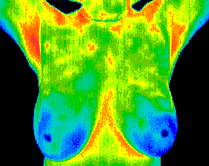After thoughts,
the reality of her choice:
Bravo to Angelina, who made 100% the
right choice for herself and her beautiful
family. However ... her body,
her genetics, her future ... they are
not yours.
1) Promoting fear of
breast cancer and offering a 'brave' choice to
cut off healthy breasts, is an unnecessary
choice for the majority of women, which serves
only to benefit certain corporate profits and
patent monopoly, to the tune of trillions of
dollars - Myriad Genetics to be specific,
based in Salt Lake City, Utah.
2) "Jolie claims
her doctor told her she has an "87% risk"
of developing breast cancer. But what she
didn't tell you is that this number
doesn't apply to the entire population:
it's actually old data derived
almost exclusively from families that were
previously documented to have very high
risks of breast cancer to begin with.
In a large room of 600 women, only ONE
will likely have a BRCA mutation in her
genetic code. The actual incidence is
0.125 to 0.25 out of 100 women, or 1 in
400 to 1 in 800." - Mike Adams,
Naturalnews.com

The cancer industry does not
care. They want you to spend 3-4 thousand
dollars for a BRCA 1 test. If the test is
positive, they want you to have a "heroic"
double mastectomy, just like sex symbol
Angelina Jolie, afterall, if she can do
it, so can you.
The cancer
industry wants you to have a mammogram
every year, which emits ionizing radiation
directly into the breast and heart
tissues, crushes the breasts, CAUSING
cancer. If you develop tumors, they want
you to have chemo and radiation, which
enables cancer to proliferate as well as
further destroy the immune system, fog the
mind, and cause permanent damage to body
organs.
- THEY DO NOT CARE IF YOU ARE
HEALTHY AND CANCER FREE OR NOT.
- THEY DO
NOT FIND AND ADDRESS THE SOURCE.
- THEY DO
NOT OFFER PREVENTION OPTIONS.
- THEY DO
NOT OFFER NATURAL CANCER CURES.
- THEY DO
NOT ADDRESS DIET.
- PROFIT
FROM DISEASE IS THE ONLY THING THAT
MATTERS.
- YOU ARE A
CUSTOMER, TAKE A NUMBER!
SERIOUS
QUESTION:
If a man has an alleged high risk factor for
prostate cancer, or contracts prostate
cancer, does this mean he needs to cut off
his testicles?
Do you have a risk of kidney
cancer? Remove your kidneys. A risk of colon
cancer? Remove your colon. Lung cancer maybe?
Remove your lungs. How about brain cancer?
Remove your brain ... just in case.
If you allow fear to
control you, the corrupt medical and
pharmaceutical corporations will get exactly
what they want. At the end of
the day, the choice is yours. EDUCATE
YOURSELF.
Swiss could be first
to drop mammograms
- June 2014
Is it the beginning of the end for
mammography, the screening technology for
breast cancer? The Swiss could be the first
to drop it after independent research
revealed that the risks outweighed any
benefits - and that earlier research, which
had provided the evidence to launch national
screening programs in most Western nations,
had been falsified.
Researchers from the Swiss
Medical Board, an independent health
research group, first reported on
mammography’s shortcomings last February,
and one Swiss canton, Uri, is now
reconsidering a move to introduce it for
routine screening.
Others may follow, and two of the
board’s researchers have spoken out this
week because they say it is ethical to do
so. “It is easy to promote mammography
screening if the majority of women believe
that it prevents or reduces the risk of
getting breast cancer and saves many lives
through early detection of aggressive
tumours.
We would be in favour of mammography
screening if these beliefs were valid.
Unfortunately, they are not, and we believe
that women need to be told so.
From an ethical perspective, a
public health program that does not clearly
produce more benefits than harms is hard to
justify. Providing clear, unbiased
information, promoting appropriate care and
preventing over-diagnosis and over-treatment
would be a better choice,” say Nikola
Biller-Andorno and Peter Juni this week.
In their earlier report, the
researchers discovered that nearly 22% of
‘cancers’ that mammography was detecting
were false (false-positives).
Despite the false reading, many of the
women went through arduous cancer
treatment, including chemotherapy and
mastectomies.
Early research, including a
50-year-old paper, suggested that screening
would save 80 lives per 1,000 women
screened. However, the Swiss research found
that just one life would be saved by
mammography.
Source:
New England Journal of Medicine, 2014
UPDATE 2016:
Top medical
experts admit that mammograpthy is
outdated and harmful - Swiss review
published in The New England Journal of
Medicine. In 2014 the Canadian National
Breast Screening study concluded the same,
as does Norway.
Source: www.naturalnews.com
IMPORTANT
CHOICE:
There is an alternative option to
mammograms, it's called Thermography
- radiation free, safer and more accurate. Available
since the 1960's, cost is about $150-$200.
 A Thermograph.
A Thermograph.
Digital Infrared imaging
"is based on detecting the heat produced by
increased blood vessel circulation and
metabolic changes associated with a tumor’s
genesis and growth. By detecting minute
variations in normal blood vessel activity,
infrared imaging may find thermal signs
suggesting a pre-cancerous state of the
breast or the presence an early tumor that
is not yet large enough to be detected by
'conventional equipment'."
Source:
https://breastthermography.com
|






